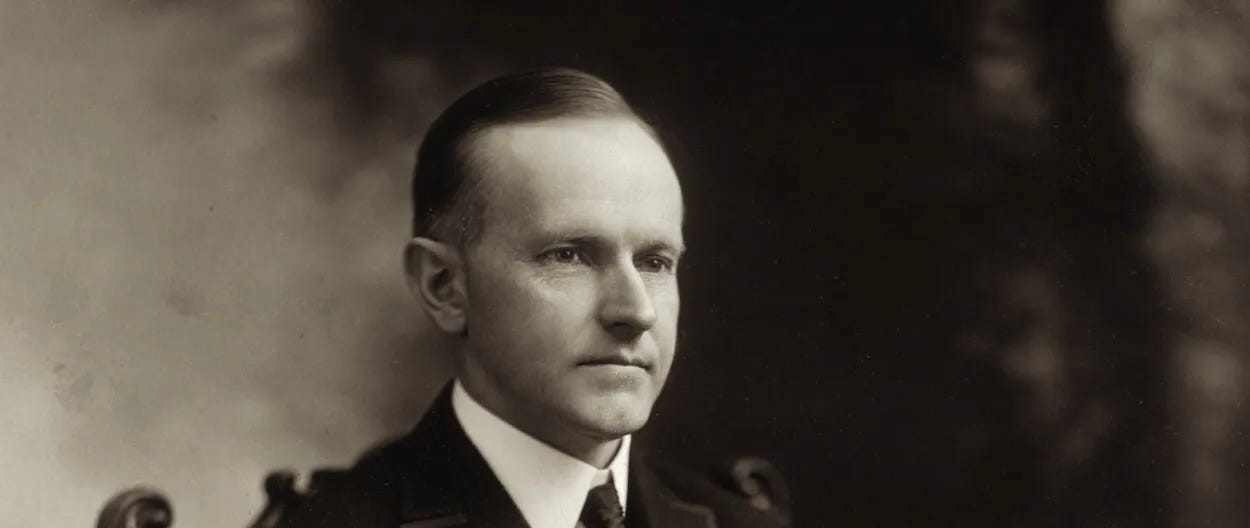Calvin Coolidge cultivated a reputation for taciturnity. At a reception he was approached by a young woman who explained laughingly that she had made a bet with a friend that she could get Silent Cal to say more than two words. “You lose," he replied.
Upon becoming president following the death of Warren Harding, Coolidge didn't look forward to a relatively new practice associated with the presidency. Early in his first term Woodrow Wilson had begun holding regular press conferences. Wilson believed, rightly, that he was the best spokesman for his policies and that by talking directly to the press he could promote his agenda. Harding, Wilson's successor, was a good talker too and carried on the tradition.
Coolidge, in keeping with his New England upbringing, rationed his words. Yet the circumstances of his accession to the presidency caused him to believe he ought to continue the practices of his predecessor. He met twice a week with reporters, sometimes delivering statements and sometimes responding to questions they submitted. He surprised himself by enjoying the experience. “When I came here I did a good deal of wondering whether I would be able to be helpful to the members of the press in these conferences that we have, and especially as to whether I wouldn't find it more or less of a bore on my part and, perhaps, not particularly pleasant,” he told the reporters at a conference several weeks after taking office. “I haven't found it that way at all. In fact, I have come to the conclusion that I rather look forward with pleasure to having you come in twice a week, in order that I may talk to you, give you a little of the idea I may have of what the government is trying to do, and satisfy you, insofar as I can, on the questions that you ask.”
Coolidge’s news conferences were mostly about public affairs. But sometimes the personal crept in. “My boys have returned back to school,” he said, referring to John and Calvin Jr. “They are just such boys as some of you have, I have no doubt. I hope that they can remain there at school without much of anything in the way of publicity.” He wanted them to have “that option which I think boys are entitled to have, of privacy in their school affairs.” The principal at the school was on board. “Dr. Irvine has been very helpful to them up there, and I presume that if you make any application to him, or any of your associates, to get any story about the boys up there, he will have to tell you that we very much prefer that they be not subjected to publicity while they are there.”
The following summer, when the boys were on vacation from school and staying at the White House, they played tennis together. Calvin Jr. developed a blister on his foot, which became infected. The infection spread to the bloodstream and the young man died of septic shock. He was sixteen.
The press pool respected Coolidge's privacy enough not to ask him about the sorrow he felt. He appreciated that. At a conference a few weeks after Calvin Jr.'s death he thanked the reporters for “the great kindness you have always exhibited towards me.”
One of the reporters asked him to reflect on his first year in office. He was characteristically modest. “I don't know as I could add anything to the sum of human knowledge by discussing my first year in the White House,” he said. “And I don't know as I would be a very good judge of what would be considered as the outstanding feature. There are so many things that might be said about it, so many different ways of looking at it. I don't know what you would call the outstanding feature. I suppose it is my nomination for the presidency, if you want to talk about political matters, and considering what the question refers to.” Coolidge had received the Republican nomination for a term in his own right. “Whether my work here has made any difference in the sentiment of the country would be something about which you could judge better than I, as you were more in touch with it before I came here.”
Coolidge won the election of 1924 but never shook the sadness he felt at Calvin Jr.’s death. He declined to seek a second full term in 1928.
In Coolidge’s time and for decades after, presidential press conferences were low-key affairs. Presidents couldn’t be quoted without their express permission. The reporters were anonymous to the public.
This changed with the advent of television. John Kennedy held the first live televised news conference, raising the stakes for him and all subsequent presidents. Presidents could no longer think aloud with reporters, the way Coolidge and his near successors had. Every word caught by the cameras and microphones entered the public record. Reporters got camera time, too, giving them an incentive to steal some of the president’s spotlight. When Watergate showed that presidents sometimes had much to hide, the reporters assumed the role of interrogators, even prosecutors. News conferences became duels between the second branch of government and the fourth estate.
Coolidge wouldn’t have liked that kind of news conference at all.


RE Silent Cal's reputation for taciturnity, another story I like is the following: Coolidge's college fraternity was holding their national convention. They'd love to have Coolidge address it, but he pleaded other obligations. They then asked if he'd at least telegraph a speech and someone would read it at the convention. Coolidge did and it read: "GREETINGS! PRESIDENT COOLIDGE."
One of the most underrated presidents in history.
Alas, that prosecutorial style of media seems to run only one way these days.